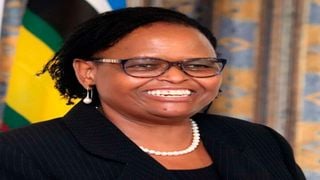
Chief Justice Martha Koome.
| File | Nation Media GroupNews
Premium
CJ Koome wants case on rejected judges dismissed
Chief Justice Martha Koome and the Judicial Service Commission (JSC) have for the first time publicly backed President Uhuru Kenyatta’s decision to omit six judges from a list of 40 individuals nominated to top courts two years ago.
In a fresh twist to the vicious war between the Judiciary and the Executive that has been ongoing for at least two years, Justice Koome and the JSC have asked the High Court to dismiss a case filed by activist group Katiba Institute, seeking to compel Mr Kenyatta to approve nomination of the six judges.
President Kenyatta last month approved the appointment of 34 judges, leaving out Justices George Odunga, Joel Ngugi, Aggrey Muchelule and Weldon Korir, who were expected to be elevated to the Court of Appeal.
High Court Registrar Judith Omange and Chief Magistrate Evans Makori were also barred from taking up their positions as High Court judges.
During the swearing-in of the Court of Appeal president Daniel Musinga last month, Justice Koome reiterated her call on the President to appoint the six judges stating that all persons nominated by the JSC must be appointed in accordance with Kenyan law.
Independence of Judiciary
She stated that the independence of the Judiciary was under serious threat and capture.
"I reiterate my position as CJ and Chair of JSC to state that all persons recommended by JSC must be appointed as judges," she said.
She had also initially said she does not know why the Head of State cherry picked the judges, and that she had no part to play in the Constitutional process.
But in what appears to be a U-turn on her stand and departure from the leadership style of her predecessor David Maraga, Justice Koome has now asked the High Court to dismiss the case filed by Katiba Institute, which seeks to force Mr Kenyatta to complete the appointments.
The JSC, which recommended appointment of the six judicial officers, has also taken a stand similar to Justice Koome.
In their joint grounds of opposition dated June 14, 2021, they have said the petition is bad in law, fatally defective and an abuse of the process of court, hence it should be dismissed with costs.
They argue that the orders sought by Katiba Institute against them cannot obtain.
"The Chief Justice and JSC have no powers under the Constitution or the law to stop any judge of a superior court or a judicial officer from performing his or her judicial functions," adds the CJ and JSC through lawyer Isaac Wamaasa.
Mandate expired
The lawyer says the Chief Justice and the JSC are now 'functus officio', meaning their mandate in the subject of the dispute is expired and they have no power to re-examine the decision on appointment of the 40 judges.
The case, which was filed in June 2020 by the lobby group on speculations and information that the President was planning to cherry-pick the judges, is scheduled to come up today (Monday) for hearing before a three-judge bench.
Katiba's lawyer Dudley Ochiel argues that the President has no lawful powers to decide who assumes the position of a judge or who does not.
However, President Kenyatta, who is a party in the case, wants court to suspend the hearing and the matter be adjourned.
In a letter to the lobby group, the President's lawyer Waweru Gatonye cites a pending ruling at the Court of Appeal.
Mr Gatonye, senior counsel, explains that the ruling from the appellate court has the potential of embarrassing the High Court should the proceedings continue and the ruling turn out to be in his favour.
This is because the intended appeal is challenging a December 2020 ruling where the High Court said the President can be sued for his action or inaction while in office, and that the law only shields him from criminal liability.
At the Court of Appeal, he is also seeking for stay of the High Court proceedings pending the hearing and determination of the appeal.
Adjourn hearing
In addition, Mr Gatonye wants the hearing to be adjourned because of another appeal filed by the Attorney General against a judgment dated February 6, 2020 where the High Court declared that Mr Kenyatta violated the Constitution for failing to appoint the judges.
He observes that the petition filed by Katiba Institute against the Head of State is seeking enforcement of the judgment that the Attorney-General is fighting at the Appellate court.
"Clearly therefore, a situation of parallel proceedings is now presented where both the High Court (comprising of three judges) and the Court of Appeal are actively dealing with the same dispute at the same time," says Mr Gatonye.
The three judges in the bench are George Dulu from the High Court in Makueni, William Musyoka (Kakamega) and James Wakiaga (Nairobi).
In the petition, Katiba Institute is questioning the partial appointment of 34 judges and omission of six.
Katiba wants court to declare that the insistence by the President that he has powers to appoint only some of the nominees recommended by the JSC as judges is unlawful, unconstitutional, and an affront to the independence of the JSC and judiciary.
The group is also seeking for a declaration that Paul Kihara Kariuki, the Attorney General, has “grossly violated Articles 10, 73, 75 and 156(6) of the Constitution, is incompetent and unfit to hold office as Attorney-General of the Republic of Kenya”.
"The Attorney-General’s conduct has resulted in violations of judicial independence and deprived citizens of the right of access to justice (Article 48), fair hearing (Article 50) and fair trial (Article 50(2)) by creating a backlog in hearing of cases," reads the petition.
It adds: "The President and Attorney-General’s refusal to appoint the judges based on undisclosed ‘adverse reports’ strips the transparency requirement in Articles 10 and 73 of all meaning".





